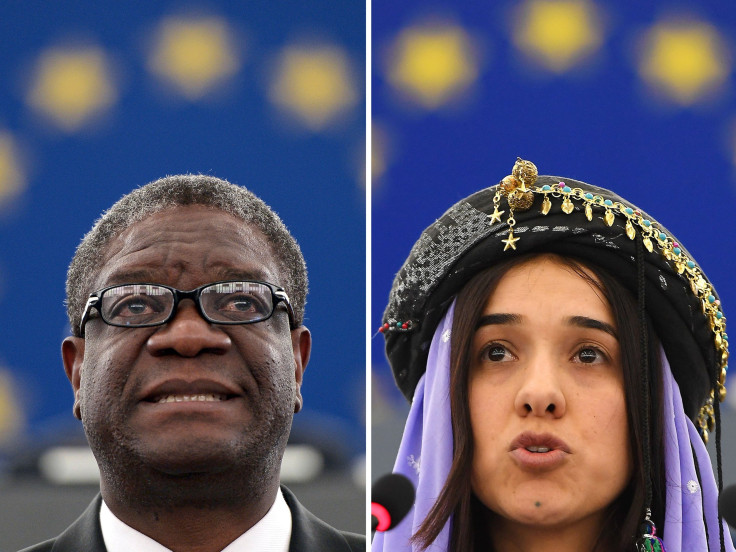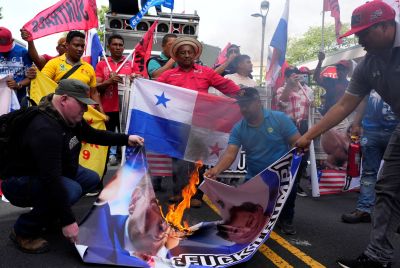Who Are Denis Mukwege, Nadia Murad? Nobel Peace Prize Winners Fought Sexual Violence

Denis Mukwege, a Congolese doctor who dedicated his life to treating victims of sexual assault, and Nadia Murad, a former Islamic State (ISIS)-captive-turned-human rights activist, are the recipients of this year's Nobel Peace Prize.
According to Norwegian Nobel Committee, Mukwege and Murad were chosen to receive the Nobel Peace Prize this year as they used "their efforts to end the use of sexual violence as a weapon of war and armed conflict."
Here are a few facts about the two awardees:
Denis Mukwege
Mukwege is a gynecologist from Bukavu, the Democratic Republic of the Congo (DRC), where he treated victims of sexual violence who were assaulted by rebel groups of the region, according to Britannica.
Having visited sick parishioners with his father, a Pentecostal minister, he recognized the need for better health and medical facilities in his hometown. Initially, Mukwege was interested in pediatric care, after returning to the DRC following the completion of his medical studies in Burundi.
However, as he worked at a hospital in the village of Lemera, he observed a number of women facing complications during childbirth and switched his focus to obstetrics and gynecology to try and find a solution to their problems.
He established an obstetrics and gynecology service in Lemera in 1989 after pursuing additional courses on the specific fields of medicine in Angers, France. Nine years later, he founded the Panzi Hospital in the region after the hospital he was working in Lemera was destroyed in Civil War. He began serving as director and chief surgeon of the facility.
The Panzi Hospital saw a sudden “epidemic” of incoming sexual assault victims, some of them as young as three years old.
In trying to uncover the reason behind the unprecedented surge, Mukwege discovered it was a result of systematic rape of women and girls alike by the Rwandan Hutu rebels, Congolese government soldiers, and other armed gangs as a means of inflicting fear into the minds of the civilian population, which aided in displacing them faster.
Under Mukwege’s supervision, medical experts in his hospital conducted reconstructive surgery on more than 20,000 women and children since 1998. He also set up a group that would specialize in the care of such patients.
Mukwege has received a number of the awards in the past for his unparalleled work including United Nations Human Rights Prize (2008), Olof Palme Prize (2008) and the European Parliament’s Sakharov Prize for Freedom of Thought.
Nadia Murad
Murad used to live a quiet life in Kocho, a village near the mountainous Yazidi stronghold of Sinjar in northern Iraq, until ISIS swarmed her region in 2014 and began killing men and taking children captive in order to train them to become terrorists.
Murad, like many women from the village, were forcefully taken from their homes to Mosul by ISIS members and condemned to a life of forced labor and sexual slavery. She herself endured three months of torture, rape and physical assaults.
In addition, she was married off to a terrorist and was thereafter forced to wear makeup and tight clothes. She finally managed to escape with the help of a Muslim friend in Mosul who aided her in acquiring false identity papers and escape to Iraqi Kurdistan.
She learnt there that six of her brothers and her mother had been killed and after that, with a help of a humanitarian organization, she fled to Germany to join her sister and continues to live there.
While recounting her harrowing experiences at the ISIS camp in front of the United Nations Security Council, Murad said one of the primary interests of the terrorists was to force Yazidi women to renounce their religion.
Yazidis are seen as heretics by ISIS. “The first thing they did was they forced us to covert to Islam," Murad said, Indian television channel NDTV reported.
Presently, Murad, who is a United Nations goodwill ambassador for survivors of human trafficking, continues the fight for the 3,000 Yazidis who remain missing, presumed to be still held captive by the ISIS. Her book, “The Last Girl," was published in 2017.
She also received EU's 2016 Sakharov human rights prize.
© Copyright IBTimes 2024. All rights reserved.






















